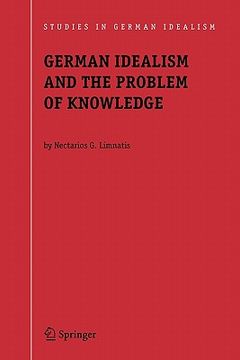Compartir
german idealism and the problem of knowledge:: kant, fichte, schelling, and hegel (en Inglés)
Nectarios G. Limnatis
(Autor)
·
Springer
· Tapa Blanda
german idealism and the problem of knowledge:: kant, fichte, schelling, and hegel (en Inglés) - Limnatis, Nectarios G.
$ 279.973
$ 349.967
Ahorras: $ 69.993
Elige la lista en la que quieres agregar tu producto o crea una nueva lista
✓ Producto agregado correctamente a la lista de deseos.
Ir a Mis Listas
Origen: Estados Unidos
(Costos de importación incluídos en el precio)
Se enviará desde nuestra bodega entre el
Lunes 01 de Julio y el
Lunes 15 de Julio.
Lo recibirás en cualquier lugar de Argentina entre 1 y 3 días hábiles luego del envío.
Reseña del libro "german idealism and the problem of knowledge:: kant, fichte, schelling, and hegel (en Inglés)"
The movement of German idealism culminates in the revelation of the re? ective boundaries of theoretical knowledge. The history of the most important intellectual developments thereafter could be described, following a recent remark of Jürgen Habermas, as a his- 1 tory of the de-transcendentalization of the cognizing subject. In this context, the epistemological interpretation proposed in this book must be speci? cally understood. Examining the problem of knowledge in the development of German idealism, it aims not at an epistem- ogy of the Cartesian type, and even less at a formal logical analysis of knowledge which lacks the re? ective element of the devices it employs as "the search for the immutable structures within which knowledge, 2 life, and culture must be contained. " These "structures" do not only condition the process of knowledge, they are themselves conditioned. There is thus an unsurpassable circle in this process, a circle which German idealism brings to the surface and profoundly scrutinizes. Therefore, the task is to re? ectively account for the historical horizons in which cognition arises (being ultimately thereupon dependent), instead of searching for an ultimate Archimedean point for its deduction. Rather than searching for inexplicably transc- dental concepts, this argument points to their determination from within a given Lebenswelt. It does not renounce but rather rede? nes 3 objectivity, by seeing the subject as a coming-to-know-itself totality. 1 J. Habermas, Wahrheit und Rechtfertigung. Philosophische Aufsätze (Frankfurt a. M.: Suhrkamp, 1999), p. 186.

